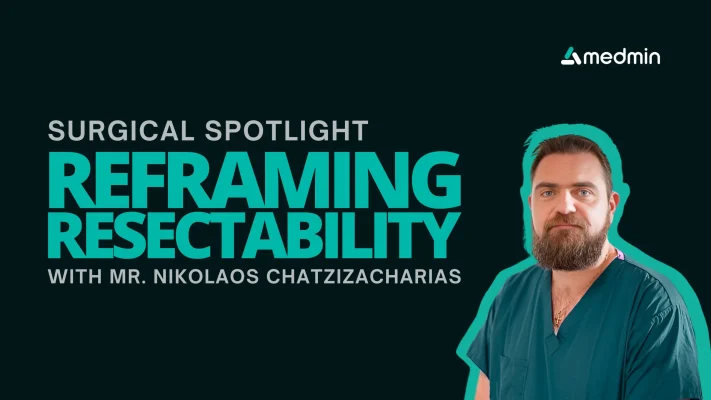How neoadjuvant pathways are changing pancreatic cancer outcomes with Mr Nikolaos Chatzizacharias
A diagnosis of ‘unresectable’ pancreatic cancer has traditionally been viewed as a turning point – a shift in patient care from curative to palliative intent. But as surgical techniques and systemic therapies evolve, so too should our understanding of what is truly ‘inoperable’.
Recent data from Birmingham’s regional neoadjuvant programme for pancreatic cancer, headed up by Medmin’s own Mr. Nikolaos Chatzizacharias, challenges the notion that surgery is off the table for patients with borderline resectable (BR) or locally advanced (LA) pancreatic ductal adenocarcinoma (PDAC). For many patients – particularly those evaluated in high-volume, highly specialised centres – resection may still be possible – and provide patients with better oncological outcomes.
Understanding borderline resectable (BR) and locally advanced (LA) pancreatic cancer
Patients with BR and LA PDAC present a unique surgical challenge due to tumour involvement with key vasculature, including the portal vein, superior mesenteric artery and vein, or coeliac axis and its branches. These cases often fall outside the scope of standard pancreatic resections and are frequently classified as ‘inoperable’ at initial assessment.
However, this classification can be dynamic, especially when neoadjuvant chemotherapy (NAC) is used to downstage tumours to an operable state.
The Birmingham experience: five years of data
Between 2017 and 2021, the Queen Elizabeth Hospital Birmingham MDT received 275 referrals for patients with BR or LA PDAC. Of those referrals, 64% commenced NAC. Among those 176 patients:
- 40-50% of BR patients proceeded to resection
- 20-30% of LA patients proceeded to resection
Median overall survival for these groups was:
- 39 months (BR)
- 33 months (LA)
Median survival with chemotherapy was only 11-12 months, whilst with no treatment, the median survival was 4 months.
It is important to note that this data also emphasised the technical feasibility of complex resection as:
- 73% involved venous resection
- 21% involved arterial resection
- 59% achieved an R0 resection margin
These outcomes challenge prevailing assumptions and underscore the potential value of referring patients for second-line surgical review, even after initial palliative labelling.
A message for referrers: reassess the threshold
This programme’s results make one thing clear: when it comes to BR/LA PDAC, early and specialist input is vital–changing the trajectory of a patient’s treatment. Yet many patients are referred late – or not at all – for second opinion assessment.
Barriers – whether based on assumptions or practical – can be significant. But the consequences are always greater: missed chances for surgery, extended reliance on systemic therapy, and ultimately, reduced survival.
Is the extent of the patients’ inoperability fixed – or simply not yet evaluated by a specialist team?
Mr. Nikolaos Chatzizacharias: surgical expertise that changes outcomes
Mr. Chatzizacharias, Consultant HBP and Liver Transplant Surgeon at Queen Elizabeth Hospital Birmingham, leads the regional downstaging programme. With fellowship training in both the UK and the USA, and extensive experience in vascular reconstruction and complex pancreatic surgery, he is a national referral point for challenging pancreatic cases.
“A lot of patients contact me for a second opinion,” he notes, “and they are frequently pleasantly surprised with what can be offered.”
His approach is multidisciplinary, pragmatic and technically confident – making Mr. Chatzizacharias a vital resource for clinicians managing complex pancreatic cancer patients, who may benefit from further evaluation.
Redefining resectability, together
The Birmingham evaluation is more than a dataset – it’s a reminder that with the right pathway and surgical expertise, we can offer more to patients even if previously deemed untreatable.
As clinicians, we owe it to our patients to challenge assumptions. A second opinion may not just confirm what’s known, it may uncover what’s possible.

